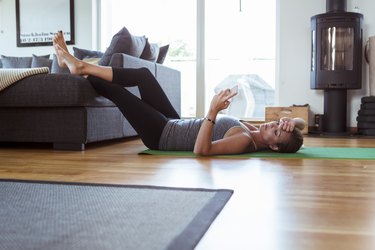
Feeling heart palpitations a day after exercise or even while exercising can be alarming. The sensation of palpitations, which people call " your heart skipping a beat," can be a sign of a potentially life-threatening heart condition, or might not be related to your heart at all.
Stop exercising and see your doctor to determine the underlying cause of your irregular heart beat. If you experience an irregular heartbeat after running or while doing other exercising, seek immediate medical attention. Chest pain that occurs with exertion but is relieved with rest is one of the earliest warning signs of a future heart attack, according to the Mayo Clinic.
Video of the Day
Video of the Day
Understanding Heart Palpitations
If you've felt a flutter in your chest, or heart pounding or beating very quickly, you've likely experienced heart palpitations, as explained by the Mayo Clinic. In addition to abnormal feelings in your chest, you might also feel these sensations in your neck or throat. If these sensations only occur once in a while and go away quickly, there's probably no reason for concern.
However, if you have chest pain or discomfort, difficulty breathing or feel lightheaded or faint, or if you are suddenly confused, seek immediate medical attention. These can be signs of a more serious heart condition. Pain or discomfort might also spread to your neck, upper back, jaw or arm, according to Cleveland Clinic.
Exercise and Heart Palpitations
There are many reasons why you might experience heart palpitations with exercise, as explained by Harvard Health Publishing. Consider what you've had to eat and drink prior to your workout. Palpitations can be caused by low blood sugar, dehydration, low potassium levels or too much caffeine.
To help avoid these culprits, eat a small meal consisting mainly of carbohydrates and protein two to three hours prior to your workout. This will allow your body to digest your food and use it as fuel for exercise.
Don't just drink water while you're exercising. Be sure to stay hydrated — drink water throughout the day and monitor your urine color. The lighter it is, the better your hydration level. If your workout will last longer than one hour, drink a sports drink during exercise to replenish electrolytes, as recommended by the Mayo Clinic.
Monitor your caffeine intake too. In addition to watching your coffee and soda intake, be sure to read the labels on your workout supplements — many of these contain high amounts of caffeine to boost energy levels.
If you're sick, you are more likely to experience palpitations when working out. Risk of this side effect increases if you have a fever or are taking certain medications. Underlying medical conditions, such as anemia and hyperthyroidism, can also cause heart palpitations.
If you are experiencing strong emotions or are under a lot of stress, you are also more likely to experience heart palpitations, as discussed in an article published in the July/August 2015 edition of Current Sports Medicine Reports.
Dealing With Heart Palpitations
When you experience heart palpitations, take note of the specific activity you are performing. Take your pulse and see if it feels irregular. Pay attention to any other physical symptoms you are experiencing.
Talk to your doctor about your symptoms. Testing might be required to help determine the underlying cause of your palpitations. Treatment can be as simple as stress reduction techniques or improving your diet, or you might need medication.
- Current Sports Medicine Reports: "Palpitations in Athletes"
- Mayo Clinic: "Heart Attack"
- Mayo Clinic: "Heart Palpitations"
- Cleveland Clinic: "Heart Palpitations"
- Mayo Clinic: "Water: How Much Should You Drink Every Day?"
- Harvard Health Publishing: "Skipping a Beat — the Surprise of Heart Palpitations"
Is this an emergency? If you are experiencing serious medical symptoms, please see the National Library of Medicine’s list of signs you need emergency medical attention or call 911.